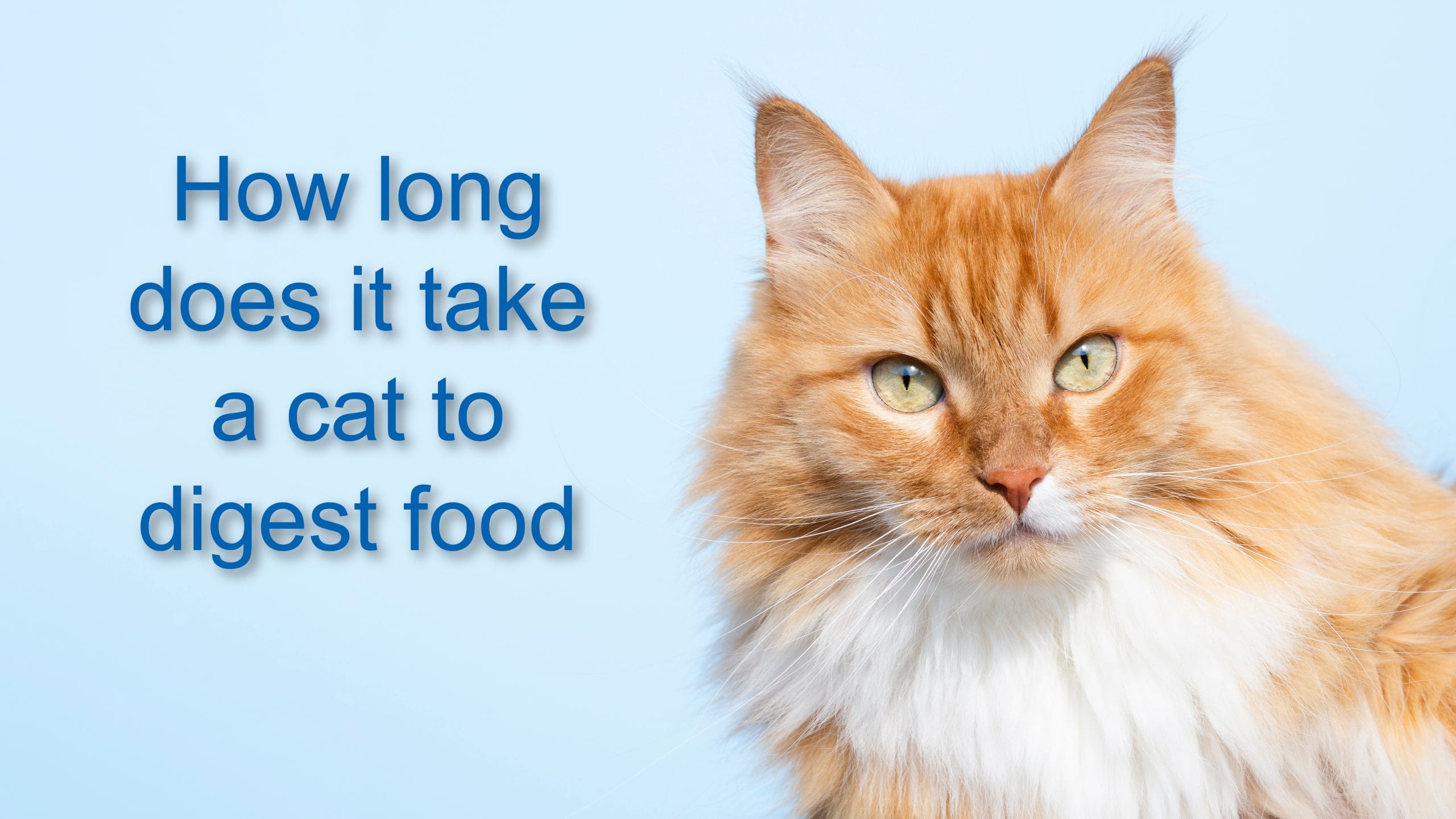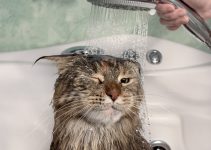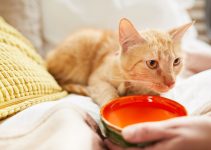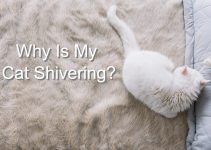If you are a cat parent, you might have noticed many differences between humans and the feline population, such as body temperature and the food we eat that are toxic for them. Veterinarians always advise cat parents to be careful with their cat’s diet to avoid any problem with their digestion, but how much do we know about this? What causes digestive problems in cats? What are the best foods for our cat’s digestive system? And how long does it take for a cat to digest food?
NOTE: We want to inform our blog readers that before we publish any article, the team “Proudcatowners” does deep research based on experience and knowledge about cats and everything related to them, to guarantees reliable and precise information, satisfy the readers is our first priority.
How long does it take a cat to digest food?
Human digestion takes about 7 to 8 hours, which seems a long time for some people. Moreover, some people think that cats and humans have the same period of digestion; however, a cat’s digestive system begs to differ. Digestion in cats takes barely less than 24 hours.
That is because the food takes nearly 10 to 20 hours to move from through the cat’s entire digestive tract. Since cats are obligate carnivores, meat is their primary source of protein and the core of their diet.
Your cat’s teeth are made for slicing through parts of meat instead of chewing them slowly and steadily, that is why they tend to swallow chunks of meat, which take longer to pass through.
Once inside the cat’s stomach, your cat’s food is broken down by a strong acid that breaks down any bones that went down your cat’s digestive tract, and it destroys even bacteria. Once the process in the stomach is finished, the food then moves to the small intestines for further digestion, in addition to extracting nutrients, which explains the period cats take to digest food.
NOTE: although it takes 10 to 20 hours for digestion in cats, it can be shorter if your cat is ill, and it is throwing up. When cats throw up, most of the time, they tend to throw up undigested food. Therefore, the period of digestion does not apply in this case.
How long does food stay in your cat’s stomach?
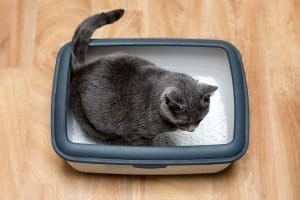
Your cat’s stomach structure is simple, and it is very similar to your stomach structure as a human as well. Once the food, for example, wet cat food, reaches the stomach, it moves to the small intestines within hours, and the stomach is emptied once again. After 8 hours or so pass, your cat’s empty stomach will begin sending signals to the cat’s brain, which will stimulate the hunger response your cat exhibits.
Sometimes, your cat might experience an upset stomach after eating a lavish meal, or a while after doing so, while the food is still in your cat’s stomach.
What is an upset stomach in cats?
The majority of complaints that veterinarians receive from cat parents are that their cat has an upset stomach, and since it already takes a while to digest food in cats, having an upset stomach does not help or ease the process of food digestion for your cat.
An upset stomach is one of the gastrointestinal disorders that cats can suffer from due to different reasons. It is when your cat is suffering from pain in its stomach, and experiencing vomiting and diarrhea, among other symptoms. This disorder can have several causes behind it, but the most common cause is food indiscretion. Your cat can also exhibit several symptoms that prove that your cat’s stomach is upset.
Causes of an upset stomach in cats
- Food intolerances
- Food allergies
- Diarrhea
- Constipation
- Stress
- Parasites
Symptoms of an upset stomach in cats
There are some visible symptoms that your cat will exhibit in case it has an upset stomach; some of the common symptoms are:
- Diarrhea
- Constipation
- Fever
- Drooling
- Foam forming around the mouth
- Mucus in stool
- Traces of blood in your cat’s feces
- Increased and sometimes decreased thirst
- Loss of appetite
- Loss of weight
- Flatulence
- Regurgitation
- Listlessness
- Unhealthy coat
- Weakness
- Rapid heart rate
What should I do?
An upset stomach in cats is not something to panic over, but it is also not something to be taken for granted. If you notice any of the symptoms mentioned above in your cat, make sure you contact a veterinarian for proper medical care. Ignoring your cat’s case will only worsen it, and would put your cat at a higher risk.
How often should I feed my cat?
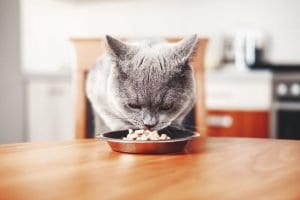
Having a meal schedule and a feeding routine for your cat would help it cope in case some changes occur in its environment because the feline population is a creature of habit, like many other populations. According to Hill’s pet, there are three different main methods:
Meal feeding:
This method of feeding your cat means you have a specific schedule that you follow to feed your cat. This schedule can be two meals per day, such as a meal in the morning, and another meal in the evening. Your cat will soon develop a habit of following the set schedule and will demand or expect food when the time is right.
Advantages and disadvantages:
This method has advantages and disadvantages. The most important advantage is that this method allows you to monitor your cat’s food intake and notice any change in appetite. In addition to that, it makes it easier for you to control your household if you had more than one cat so that they can all eat, instead of one cat dominating the other (s), eating all the food and gaining weight, while the other ones sit aside and starve. A significant disadvantage is that your cat would ask for food between meals and beg for treats because it cannot control its hunger.
NOTE: if you have adopted this method by following a veterinarian’s advice, you would know how much food to serve for your cat each meal so that it does not get hungry between meals, nor begs for food. It is always better to consult a veterinarian before adopting any method.
Free feeding:
This method means you leave food available and at your cat’s disposal all day. Many pet parents wonder if this method is a good one or not, while others say that it fits them the best. When food is always available, your cat will eat at its own chosen times and schedule, and according to its hunger cycles.
Disadvantages:
This method makes it challenging for you to monitor your cat’s appetite and food intake. Too much freedom when it comes to feeding your cat can lead to overeating, causing several health issues such as obesity and diabetes. And if you have a multiple cat household, you would not be able to tell which cat is eating well, which cat is overeating, and which cat is being dominated and deprived of food, or if it lost its appetite.
NOTE: Please note that this method can only be adopted with dry cat food. Wet or canned cat food will go bad if left out in the open for too long. If your cat’s dry food stays in its bowel for more than one day, make sure you throw it. You should not risk your cat’s health.
Combination feeding
This method includes both of the methods that we mentioned above. For example, you can serve your cat wet cat food during specific times of the day, and offer it some kibbles in between meals as treats. This method allows your cat to eat several meals of small portions throughout the day and gives it the best of both worlds when it comes to nutrients from both dry and wet cat food. However, it can also lead to obesity or diabetes, and it makes it challenging to monitor your cat’s appetite and its food intake.
Important factors to consider
Your cat’s age and health play a crucial role in its feeding times and food amounts you serve for it. Small kittens tend to need more food while growing up because it helps in their growth. Obese cats or cats with diabetes, for example, should have a monitored feeding schedule, especially if your cat has a chronic disease, and it is taking any kind of medication.
The standard feeding rate is from two to three meals per day for adult cats. However, two meals per day are also acceptable. As for kittens, they tend to be fed more often during the day, you should always consult your veterinarian about the amount of food you serve for your cat, and when do you serve it, because this can also affect the cat’s digestion. In addition to that, make sure you consider your schedule and plan a feeding schedule for your cat.
Mistakes you should avoid when feeding your cat
- Serving too much food
- Feeding your cat dry food only.
- Not providing your cat with enough water.
- Adding garlic to your cat’s food to cure tapeworms
- Adopting a vegetarian or a vegan diet
- Adopting a non-balanced diet
- Lack of nutrients in your cat’s diet
Digestive disorders in cats
First, let us start with a simple definition of digestive disorders. Gastrointestinal and digestive disorders are any disorders that your cat experiences, leading to problems with the digestive process.
These digestive disorders are common in cats, and they reduce the absorption of food, its digestion, or change its channel of passage in the gastrointestinal tract. Healthy and efficient digestion is crucial for your cat’s health because it allows it to gain energy and repair damaged tissues and build a new one, to grow strong and healthy. If your cat experiences these digestive problems, it will have severe consequences on its stomach and intestines, causing it a lot of pain.
What causes digestive disorders in cats?
Having an upset stomach is one of the digestive disorders your cat can suffer from, and that disorder has a lot of causes in common with other digestive disorders.
Causes of digestive disorders:
- Food intolerance
- Food allergies
- Food sensitivities
- A deficiency in digestive enzymes
- Infections
- Eating a portion of food that is not fit for cats.
How do I know if my cat has a digestive disorder?
Digestive disorders have few distinct symptoms for each disorder; however, they have many traits in common. Here is a list of the common signs, which your cat could exhibit:
- Vomiting
- Diarrhea
- Traces of blood in the stool
- Mucus in stool
- Weight loss
- Flatulence
- Abdominal pain
- Loss of appetite
- Weight loss
What are the digestive disorders that my cat can experience?
Here are some of the digestive disorders your cat can have:
Colitis
This disorder is more common in cats who are 5 years old or younger and is also known as inflammation or irritation of the colon. This disorder can be chronic, and it could last for weeks, or it can also be acute and occurs suddenly. Diarrhea is the most common symptom of colitis, but here is a list of other signs:
- Mucus and/or red blood in the stool
- Visits the litter box more often
- Straining when defecating
- Constipation
- Lethargy
- Loss of appetite
- Weight loss
What causes colitis in cats?
- Intestinal parasites
- Foreign body
- Stress
- Feline leukemia virus
- Feline immunodeficiency virus
- Feline infectious peritonitis
- Reactions to medications, such as antibiotics
- Pancreatitis
- Dietary indiscretion
- Bacterial infection
- Idiopathies
- Inflammatory bowel disease
- Bowel cancer
Gastroenteritis
Acute gastroenteritis in when the digestive tract becomes inflamed. It can be caused by the following:
- Ingesting foreign objects
- Parasites
- Eating spoiled or expired food
- Food allergies
- Stress
- Eating toxic plants
Exocrine pancreatic insufficiency (EPI)
This disorder makes the pancreas produce insufficient amounts of digestive enzymes, which will cause the prolonging of digestion in cats. It can be caused by masses that block the duct of the pancreas, or by chronic pancreatitis.
How do I know if my cat has EPI?
Here is a list of clinical syndromes that usually appear in cats:
- Occasional diarrhea
- Remarkable weight loss
- Unhealthy coat
- Anorexia
- Increased appetite
- Lethargy
- Vomiting
Irritable bowel syndrome
This syndrome is usually associated with bowel inflammation. The veterinarians linked this to the cat’s inability to pass food through the gastrointestinal tract efficiently, and to food intolerance.
Pancreatitis
This disease occurs in cats when their pancreas is infected or inflamed. It is usually caused by dehydration, low blood flow, and other underlying diseases or disorders.
Small intestinal malabsorption
As the name of the disorder implies, this disease results in impairing the absorption of nutrients because the small intestines are inflamed.
Diarrhea and constipation can be both a symptom and a disorder. You might have noticed that the disorders mentioned have similar symptoms, and one disease can sometimes be the cause of another one.
What should I do?
If you notice any of the symptoms mentioned above in your cat, make sure you immediately consult with your veterinarian. If you see that your cat is experiencing these symptoms after trying a portion of new food, for example, refrain from serving this food until you take it to a veterinarian and seek medical advice.
In addition to that, provide your vet with all the necessary information concerning your cat’s condition, what it ate, and how long it has been experiencing these symptoms.
My cat swallowed a foreign object “how can I save it”?
If your cat swallows any foreign object that is hard to digest, it can lead to what we call bowel obstruction or intestinal blockage in cats. This case can be life-threatening if it is not dealt with immediately. Some of the symptoms that could show on your cat include lethargy, complete loss of appetite, pain and growling, difficulty when defecating, or rare defecating.
If you notice that your cat has swallowed something with a string attached to it, and the string is still hanging from your cat’s mouth, NEVER pull the string or attempt to extract the object by yourself. If this occurs in your cat, digestion will take much longer than usual, which is dangerous for your cat.
What should I do?
Contact your veterinarian immediately, because bowel obstruction can lead to severe illness and even death. Your vet might try to force vomit your cat or extract the foreign object by conducting surgery. Avoid leaving random objects near your cat to prevent this painful situation for your cat, and protect their digestive process.
My cat’s stomach keeps growling
If your cat’s stomach is growling, it means their digestion has something to do with it. There are three main reasons why your cat’s stomach is growling. The first one would be swallowing too much air; for example, when it eats too fast, which is why you hear its stomach growling whenever digestion occurs.
The second reason is gasses. Your cat’s diet might be causing the production of gasses in the gastrointestinal tract during digestion, which explains the growling sounds coming from its stomach, which could imply that it is time to switch up the diet.
And the third reason is diarrhea. If this is an uncommon thing for your cat, try to monitor its litter box, because this could be a sign of possible diarrhea. Be patient when doing so, because it depends on how long the digestion takes in your cat.
Wet Vs. Dry cat food for bowel movement
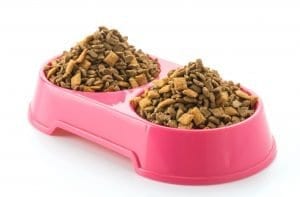
When it comes to your cat’s digestion, and how long it takes, many pet owners disagree on which food to serve. However, many of them agree that wet cat food is better for your cat’s bowel movement because it has more moisture. that is why many cat parents opt for wet cat canned food. It helps with dehydration and constipation, which could make the digestion process longer.
Tips for better digestion in cats
- Monitor their food and their appetite
- Keep track of what they eat.
- Never change their food or their diet at once, do it gradually.
- Do not feed it leftovers and table scarps.
- Always consult with your veterinarian.
Conclusion
Your cat’s digestion process takes much longer than yours, and sometimes, it can take longer due to some disorders and conditions in your cat. Digestion in cats usually takes from 10 to 20hours for food to pass through their entire digestive tract. If your cat is experiencing vomiting, the process will be a lot shorter, because the cat would usually throw up undigested food.
Some of the disorders that your cat can experience can affect its digestion, such as gastroenteritis, irritable bowel syndrome, and colitis. Many cats suffer from an upset stomach, and it can be due to many reasons, but the most common one is food intolerance.
You can feed your cat using different methods, such as a meal feeding method, a scheduled feeding plan, a free feeding method, and a combined feeding method. Many pet parents prefer serving wet food to their cat to help with its digestion, and there is other advice to improve your cat’s bowel movement, such as monitoring its diet and keeping track of what it eats.
In case your cat’s stomach keeps growling, it can be because of excess air or gasses in its gastrointestinal tract. Always consult with a veterinarian for proper advice, and make sure you book an appointment immediately if your cat has a bowel obstruction. Knowing the digestive disorders and their symptoms would help you improve your cat’s digestion and monitor how long does it take for a cat to digest food.

